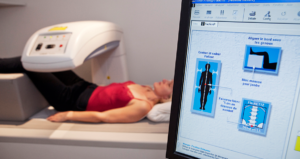What a Bone Density Test Can Do
A bone density test tells you if you have normal bone density, low bone density (osteopenia) or osteoporosis. It is the only test that can diagnose osteoporosis. The lower your bone density, the greater your risk of breaking a bone. A bone density test can help you and your healthcare provider:
- learn if you have weak bones or osteoporosis before you break a bone
- predict your chance of breaking a bone in the future
- see if your bone density is improving, getting worse or staying the same
- find out how well an osteoporosis medicine is working
- let you know if you have osteoporosis after you break a bone
Who Should Have a Bone Density Test?
- you are a woman age 65 or older
- you are a man age 70 or older
- you break a bone after age 50
- you are a woman of menopausal age with risk factors
- you are a postmenopausal woman under age 65 with risk factors
- you are a man age 50-69 with risk factors
- an X-ray of your spine showing a break or bone loss in your spine
- back pain with a possible break in your spine
- height loss of ½ inch or more within one year
- total height loss of 1½ inches from your original height

 Are you a postmenopausal woman or man age 50 and older? Have you recently broken a bone? If you answered “yes” to both questions, you should talk to your doctor or other healthcare provider about getting a bone density test if you’ve nevern had one.
Are you a postmenopausal woman or man age 50 and older? Have you recently broken a bone? If you answered “yes” to both questions, you should talk to your doctor or other healthcare provider about getting a bone density test if you’ve nevern had one.
